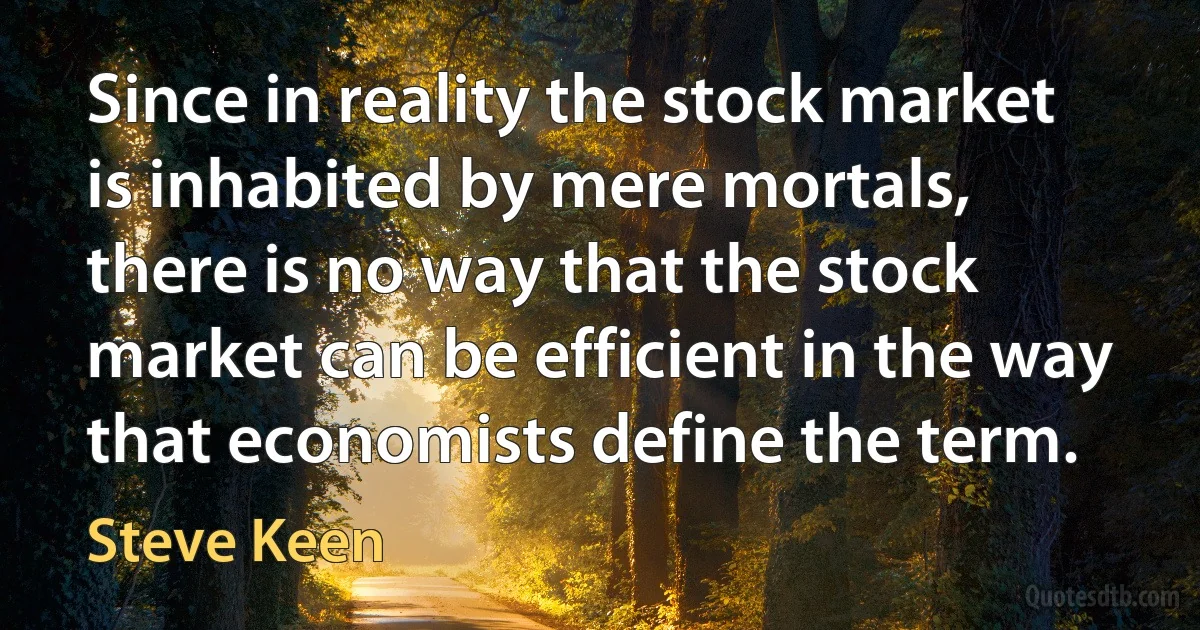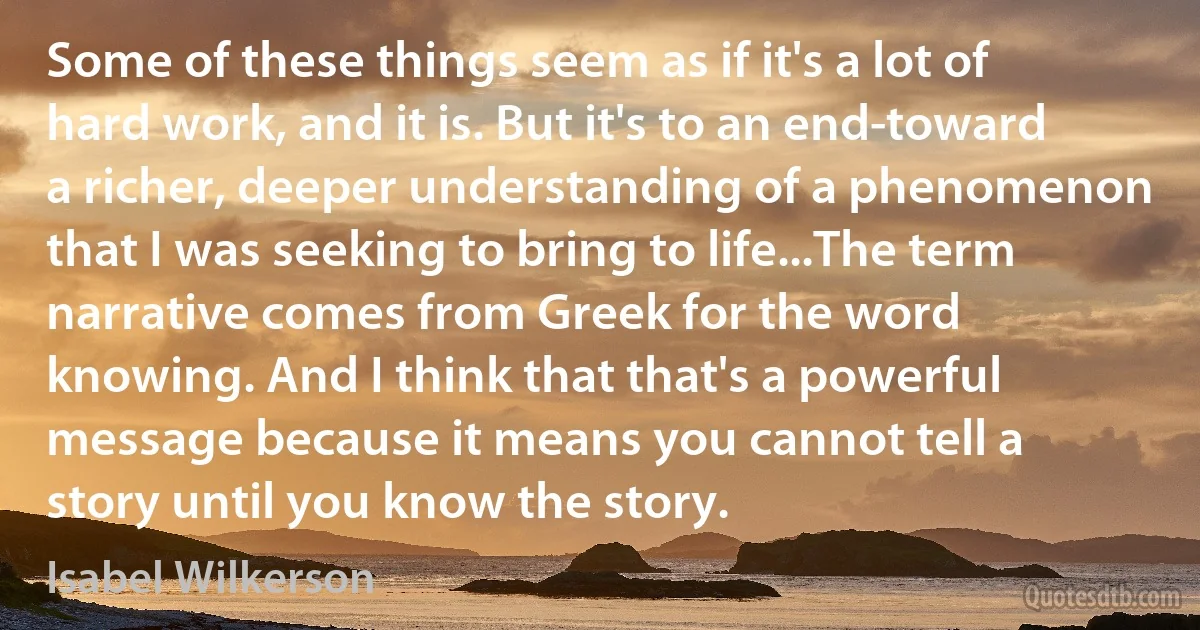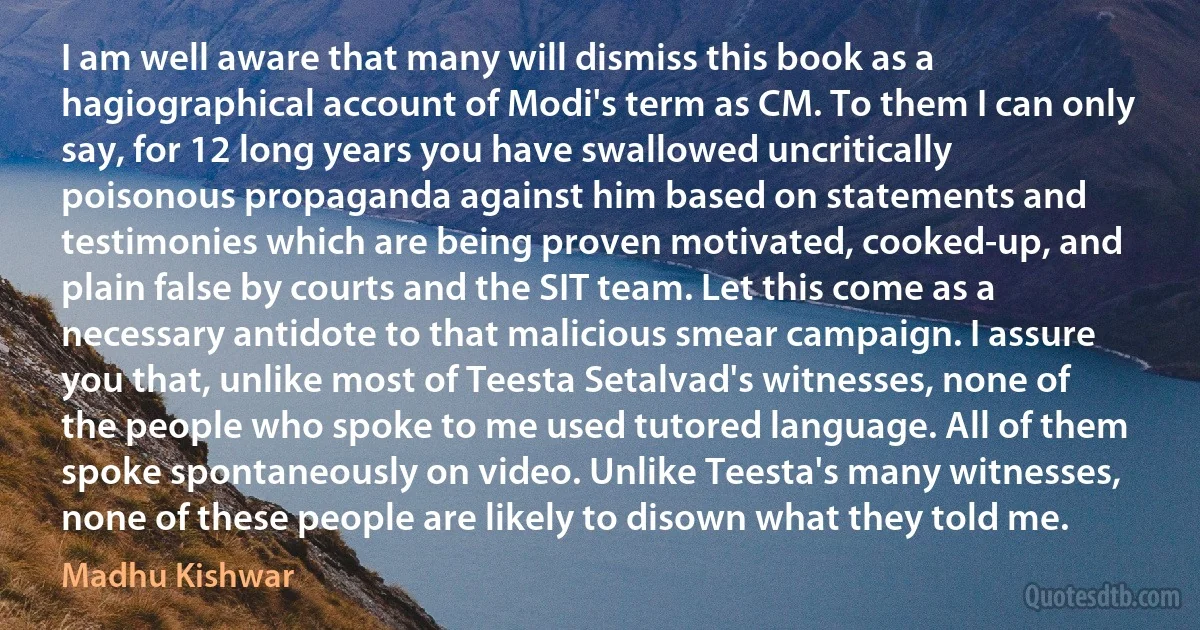Term Quotes - page 46
The BJP is not a communal party; it cannot be, for the simple reason that Hindus have never been, and are not, a community in the accepted sense of the term. They represent an ancient civilization not known either to draw a boundary between the faithful and the faithless, the blessed and the damned, or to engage in heresy hunting and its counterpart, persecution of other faiths. Hindus are, in western terms, pagans.

Girilal Jain
The term propaganda rings melodramatic and exaggerated, but a press that-whether from fear, careerism, or conviction-uncritically recites false government claims and reports them as fact, or treats elected officials with a reverence reserved for royalty, cannot be accurately described as engaged in any other function.

Glenn Greenwald
From our vantage, materialism is not a neutral, value-free, minimalist position from which to pursue inquiry. Rather, it is itself an ideology with an agenda. What's more, it requires an evolutionary creation story to keep it afloat. On scientific grounds, we regard that creation story to be false. What's more, we regard the ideological agenda that has flowed from it to be destructive to rational discourse. Our concerns are therefore entirely parallel to the evolutionists'. Indeed, all the evolutionists' worst fears about what the world would be like if we succeed have, in our view, already been realized through the success of materialism and evolution. Hence, as a strategy for unseating materialism and evolution, the term "Wedge" has come to denote an intellectual and cultural movement that many find congenial.

William A. Dembski
Why, how can you ask such a question? You are a republican."
A republican! Yes; but that word specifies nothing. Res publica; that is, the public thing. Now, whoever is interested in public affairs -- no matter under what form of government -- may call himself a republican. Even kings are republicans."
Well! You are a democrat?"
No."
What! "you would have a monarchy?"
No."
A Constitutionalist?"
God forbid."
Then you are an aristocrat?"
Not at all!"
You want a mixed form of government?"
Even less."
Then what are you?"
I am an anarchist."
Oh! I understand you; you speak satirically. This is a hit at the government."
By no means. I have just given you my serious and well-considered profession of faith. Although a firm friend of order, I am (in the full force of the term) an anarchist. Listen to me.

Pierre-Joseph Proudhon
If a firearm is used by a criminal or psychopath with evil intentions, then it is a tool for evil. But if it is used for good (to defend life and property), then it is a tool for good. A firearm by itself has no sentience, no volition, no moral force, and no politics. The proper term for this is an adiaphorous object--something that is neither good nor evil. A firearm is simply a cleverly-designed construction of metal, wood, and plastic in the form of a precision tool.

James Wesley Rawles
As it was, deformed and made mad by his hellish life, he had become what prophets had probably always been: not frauds, for they themselves believed what they had seen, but pitiful creatures, dreaming some salvation from this crushing world in their malfunctioning brains. Yaum ed din, the crazy little man, the prophet Aida's John the Baptist, had said: the Day of Religion, the Muslim's term for Judgment Day. Yaum ed din, the last consolation of the crazy and the weak.

Jamil Nasir
Fijians understand that unless their sovereignty is reinstated their status is subject to the manoeuvre of politicking. They feel that their status is devoid of its proper authority and spirit. When Fijians continue to feel this way, its impact on the longer term stability and security of our country is a matter that should be addressed and resolved amicably.

Josefa Vosanibola
The courts have properly determined that a man should neither be able to force a woman to have an abortion nor to prevent her from having one, should she so choose. Justice therefore dictates that if a woman makes a unilateral decision to bring pregnancy to term, and the biological father does not, and cannot, share in this decision, he should not be liable for 21 years of support. Or, put another way, autonomous women making independent decisions about their lives should not expect men to finance their choice.

Karen DeCrow
The term spirituality is misleading. It gives the impression that we are concerned only with the soul and its activities like prayer and contemplation. The realm of the spirit is thought of as distinct from the material realm, the realm of work, of science and economics. Underlying this dichotomy is the Greek understanding of the human person as a composite of soul and body or as a soul temporarily housed in the body. The classical example of this is Plato's image of the human person as the charioteer in the chariot.

Kurien Kunnumpuram
I think it is important to distinguish between the traditional notion of patronage and the public relations maneuvers parading as patronage today. Invoking the name of Maecenas, corporations give themselves an aura of altruism. The American term sponsoring more accurately reflects that what we have here is really an exchange of capital: financial capital on the part of the sponsors and symbolic capital on the part of the sponsored. Most business people are quite open about this when they speak to their peers. Alain-Dominique Perrin, for example, says quite bluntly that he spends Cartier's money for purposes that have nothing to do with the love of art.

Hans Haacke
Ever since 1953, when Russell Kirk produced its intellectual coat of arms, conservatism has been "what Edmund Burke wrote." This is the equivalent of Arthur Danto's institutional theory of art-art is whatever the art world says it is. But it's also a cop-out. Instead of analyzing conservatism in an Aristotelian way, instead of asking how we use the term in real life, we just describe Burke. In the process, don't we risk fleeing into what Tanenhaus calls an "alternative universe"? If conservatives are "glaringly disconnected from the realities now besetting America," as Tanenhaus says, why is the solution to be more like a man who wore a powdered wig? Liberals have problems of their own, but, to their credit, they don't sit around debating whether Hillary Clinton or John Edwards is the "real Rousseauian."

Mark Riebling
Following the lead given by new institutional economics, we shall take the transaction as our unit of analysis. For our purposes, a transaction can be thought of as any act of social exchange that depends on information flows for its accomplishment. Transactions can be as simple and brief as the purchase of a packet of cigarettes, or as complex as and extended as those which bind a Zen master to his disciples. Like institutional economists, we are interested in the relationship that can be established between different transactional characteristics and the phenomenon of institutionalization. Our use of the term transaction, however, will extend beyond that of institutional economics where the focus has tended to be primarily on transaction costs and efficiency considerations. These, to be sure, are relevant. But, as we shall see, they are not the whole story.

Max Boisot



